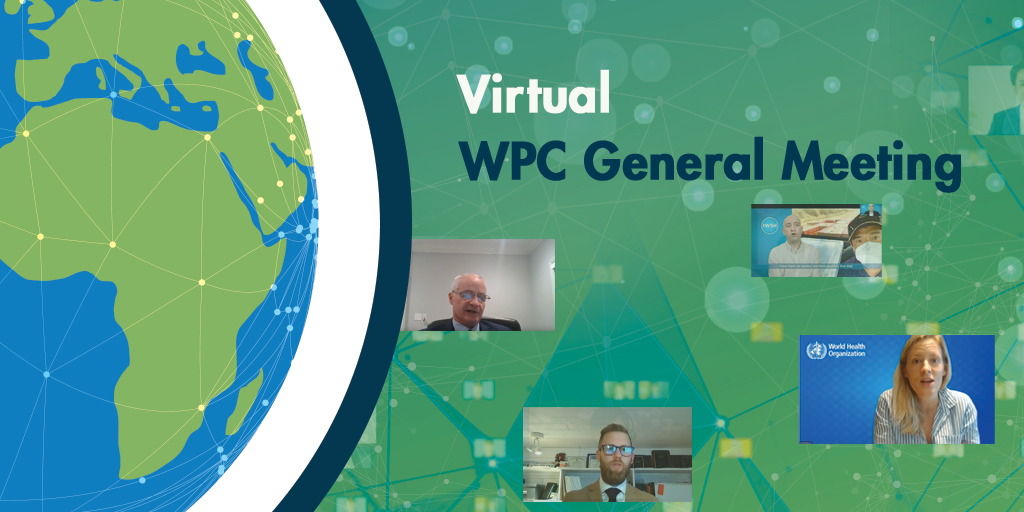
|
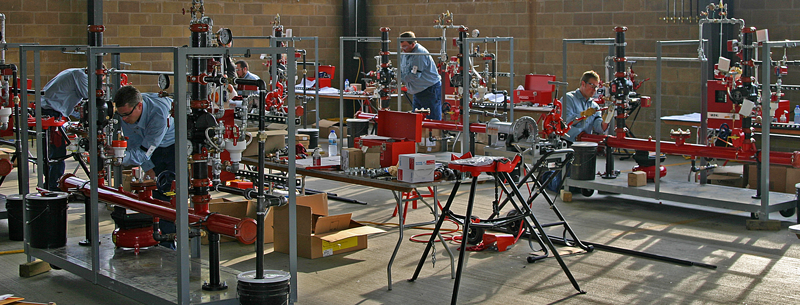 |
Above: UA Apprentice Competition, pre-pandemic The International Association of Plumbing and Mechanical Officials (IAPMO), the United Association of Journeymen and Apprentices of the Plumbing and Pipe Fitting Industry of the United States, Canada (UA), the Plumbing-Heating-Cooling Contractors — National Association (PHCC), and Plumbing Manufacturers International (PMI) applaud the U.S. House of Representatives for bipartisan passage of the National Apprenticeship Act of 2021 (H.R. 447) on Feb. 5 and strongly encourage the U.S. Senate to approve it as well. The bill seeks to reauthorize the 1937 National Apprenticeship Act, which established the registered apprenticeship system, for the first time since its inception 84 years ago. Many characteristics today associated with registered apprenticeships — progressive wage increases, mentorship and safety standards — are not part of the 1937 law; they have instead been included in subsequent U.S. Department of Labor regulations. These provisions and more would be codified into the new federal law, as well as expanding apprenticeship programs through authorization of $400 million to $800 million in new grant funding. Registered Apprenticeships (RAs) are America’s most successful federally authorized workforce development program. According to the U.S. Department of Labor, 94 percent of people who complete RAs are employed upon completion, earning an average starting wage above $70,000 annually. The success of the registered apprenticeship system is a product of the strict quality standards, close engagement with industry, and strong worker protections that the programs are required to uphold. All RAs must combine on-the-job learning with related instruction to provide workers a nationally recognized credential from the Department of Labor (DOL) that they can present to potential employers anywhere in the country. More than 1,200 apprenticeable occupations now exist, from the traditional construction and military occupations to newer sectors such as information technology, finance, and health care. Yet, according to the most recent data, apprenticeships make up only 0.3 percent of the overall workforce in America. “Apprenticeships are a proven pathway to well-paying employment,” said IAPMO CEO Dave Viola. “We applaud the U.S. House of Representatives for passing this important piece of legislation and encourage the Senate to quickly pass it as well. We face increasingly complex water and infrastructure challenges in the United States. The registered apprenticeship program is essential to ensuring that our country has the skilled workforce required to meet these challenges. IAPMO is proud to stand with the UA, PHCC-NA and PMI in celebrating this landmark legislation.” “The brothers and sisters of the United Association of Union Plumbers & Pipefitters (UA) are the best trained and most highly skilled craftspeople in the world — and that’s because of our rigorous training standards and the robust investments we make each year in our Registered Apprenticeship program,” said UA General President Mark McManus. “This reauthorization of the National Apprenticeship Act ensures Registered Apprenticeships can reach new industries and that exploitative contractors cannot cut corners. Our members can rest assured that UA apprenticeships will remain the gold standard in the construction industry with the passage of this bill.” By bringing together industry sector leaders and experts, including employers, industry associations, joint labor-management organizations, labor organizations, education and training providers, credential providers, and apprentices, the bill would establish national frameworks for industry-recognized apprenticeable occupations. “PHCC, as one of the leaders in apprentice education, has recognized the value of apprentice training throughout its 138-year history and welcomes this legislation that reaffirms and streamlines the Registered Apprentice Program,” said PHCC National President Hunter Botto. “PHCC and the PHCC Educational Foundation will continue their educational efforts utilizing Registered Apprenticeships in furthering their Pledge to America’s Workers goal of preparing 75,000 future industry professionals over the next five years. We are grateful for the introduction of this legislation and urge prompt consideration and support of its passage as a signal that apprenticeship can lead to good jobs, with good pay, and a future for advancement.” In addition to strengthening and expanding apprenticeship opportunities nationwide, passage would mitigate efforts across many states that threaten to weaken the plumbing industry through delicensing and/or elimination of plumbing boards. “Plumbing manufacturers provide skilled, good-paying jobs in communities across America, but the shortage of well trained, skilled workers is real,” said PMI CEO Kerry Stackpole. “Our manufacturers produce 90% of all plumbing products sold in the nation. To strengthen America’s manufacturing sector, we need to utilize all the tools and resources available to help us attract and train new talent, including apprenticeships. The expanded opportunities to registered apprenticeships, youth apprenticeships, and pre-apprenticeships made available through the National Apprenticeship Act of 2021 will help close the skilled workers gap and shortage of plumbers, create good-paying jobs in our communities, and help aid in our country’s economic recovery.” H.R. 447 may be viewed in its entirety HERE.
A REPORT ON THE INDIAN PLUMBING ASSOCIATION’S (IPA) STRIDE TO FIGHT THE COVID-19 CRISIS
Submitted by B. S. A. NARAYAN, WPC Board Member The COVID-19 pandemic has brought about a sea change in the way we have dealt with business in the year 2020. We present a synopsis of the IPA’s stride to counter the pandemic from June to December 2020. Complying with the government of India’s guidelines, the Indian Plumbing Association (IPA) permitted most of its employees to work from home to the fullest extent possible. At the same time, we have tried to resume economic activity. A brief note on the IPA activities is detailed below. Indian Plumbing Professionals League (IPPL) 2020 – Launching of Virtual format IPA has received a lot of praise from across the building fraternity for the way IPPL has intricately planned and conducted the event at the virtual level. The grand finale was held Dec. 6. The event was presided by WPC Chairman Tom Bigley as chief guest and Tom Palkon, executive vice president of Water Systems for IAPMO R&T, as guest of honor.The participants received a complimentary IPA Professional membership and learned some of the nuances of plumbing in these sessions. Visit the IPA website at www.indianplumbing.org/IPPL-2020 for more details on IPPL 2020. Magazine publication resumes The soft copies of the past three editions are available on the IPA website: www.indianplumbing.org/Indian-Plumbing-Today-IPT Webinars conducted A complete list of webinars along with recordings is available on this webpage: www.indianplumbing.org/Virtual-Technical-Sessions Social media and emails For updates log in to: COVID-19 vaccination program In India The pandemic in India has lasted for more than 10 months now. India appears to have gotten a grip over the coronavirus, as the curve has flattened as of January. India is driving the world’s largest vaccination program. India vaccinated and immunized about 2.4 million people within a week after starting and plans to vaccinate 300 million people throughout India by July 2021. Slowly but surely, India is stepping into a leadership role and displaying compassion, the kind of which has never been seen before. India is known as the world’s pharmacy. India is the largest USFDA-approved vaccine manufacturer, with a reputation for top-notch standards. The Serum Institute of India is manufacturing the Oxford/Astrazeneca Covishield vaccine and is looking to produce around 10 million doses of Covishield to cover health line providers, frontline workers, and the most vulnerable people. India is ensuring equitable distribution of vaccines. Prime Minister Narendra Modi said, “Today, India is ready to save humanity with two ‘Made in India’ COVID-19 vaccines.” India is being appreciated and praised globally for its persistent effort. Bill Gates lauded India and posted, “It’s great to see India’s leadership in scientific innovation and vaccine manufacturing capability as the world works to end the COVID-19 pandemic.” WHO Director-General Tedros Adhanom Ghebreyesus tweeted, “India continues to take decisive action & demonstrate its resolve to end #COVID19 pandemic. As the world’s largest vaccine producer, it is well placed to do so. If we #ACTogether, we can ensure effective & safe vaccines are used to protect the most vulnerable everywhere. The demand for the Covishield vaccine goes beyond SAARC nations and the subcontinent. India is not only vaccinating its own, but also nursing neighborhoods back to health by gifting the vaccine to neighboring countries like Bhutan, Maldives, Nepal, Bangladesh, Myanmar, Mauritius and Seychelles. Sri Lanka and Afghanistan are next on the list. India’s vaccine diplomacy on the other hand will generate goodwill in the world. India believes in “Vasudhaiva kutumbamkam” meaning “The Whole World is a Family”. (Source : Wion - Gravitas Plus )
PLUMBERS ASSOCIATION OF ZAMBIA (PAZA) PARTNERS WITH ACCESS WATER4 ZAMBIA |
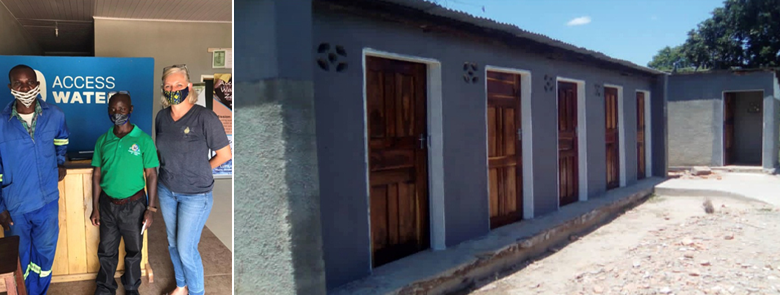 |
Submitted by Moses Chongo, CEO/President, Plumbers Association of Zambia The partnership between PAZA and Access Water4 Zambia started in 2020 after the International Water, Sanitation and Hygiene Foundation (IWSH) introduced introduced the two organizations. The main reason for the partnership is because of the common value and roles both organizations play for the benefit of vulnerable people in the community, especially in water supply, water sanitation and hygiene. Water4 is a charitable Christian organization based in Samfya, Luapula, Zambia. Water4 has been working on a strategy with the Accord WASH Alliance members to implement WASH in Health Care Facilities (HCFs) projects in Zambia that will soon take place in four districts, including Samfya. This is due largely to help from the IWSH Foundation to connect Water4 to PAZA. Water4 has identified PAZA as a potential local partner for the installation of plumbing facilities and maintenance of water facilities for sustainability of WASH in HCFs. Three local PAZA members were recently contacted by Water4 to complete some connections and upgrade plumbing facilities at Lusaka Special School, which is now complete and functional. The same team has constructed handwashing stations at two schools as part of the response to COVID19, which is being connected to the purified water system that has been installed in the community. The Plumbers Association of Zambia, since establishing the Lusaka Wash Academy (LWAC), has been engaged to train 35 plumbers and pump menders in Samfya who will be responsible for all of the activities.
Above: New taps and kitchen sink for the boarding at Kasanka special school. PAZA SIGNS MOU WITH LUANGUA CHILD DEVELOPMENT AGENCY/CHILDFUND INTERNATIONAL
Jan. 13 was another great day for PAZA. The Luangwa Child Development Agency, in partnership with ChildFund International, entered into a skills training project in the Luangwa district. So far, 27 plumbers have been trained and 38 from distinct different skills. The mandate of LCDA is to have communities in which children and youths meet their basic needs such as good sanitation, shelter education and health, and are protected from all forms of harm and abuse. PAZA’s mandate is to provide quality skills training services in water sanitation, plumbing and other skills. Both parties agreed to implement the project for the benefit of the children and the community of Luangwa district and Zambia as a whole. PAZA will also continue to improve current conditions pertaining to water sanitation and plumbing systems in school, homes, clinics and marketplaces. PAZA has been given the task of increasing the number of learning facilities by providing training, promoting skills development and hygiene, and combating water-related diseases and COVID-19 by improving water reticulation systems in the community.
|
 |
Is “good” good enough when it comes to customer service? As far as The IPG and its supplier Lecico are concerned, the answer is NO! Many companies underestimate the importance of excellent customer service; great products on their own are not always enough to keep a customer’s loyalty, but outstanding service and customer satisfaction are — both The IPG and Lecico strive to offer just that. Kevin Oakes, director of sales at The IPG, said: “Only the businesses that find a way to make customer support a core element of their business strategy can thrive under today’s environment. We put The IPG member at the center of what we do — what’s right for them is right for us. We put members first and support them, our mantra is that we are Stronger Together.” During recent times, The IPG has played its part in supporting its independent plumbing, heating and bathroom store members. For example, during the early days of the pandemic, the common message published across its marketing channels highlighted those member businesses that remained open, advising opening times and the level of service they were providing. It has continued to deliver positive messages to ensure that members’ customers continue to shop in their local area. Paul Barry (MD) from Four Ashes Plumbing Supplies, an IPG member based in Wolverhampton, commented: “In a marketplace more competitive than ever, and with the challenges facing all independent businesses in the UK, we place great value in our partnership with The IPG. A collaborative approach between the group, its supply network and its members help small businesses like ours to remain at the forefront of the industry and relevant to the communities we serve.” Customers do not forget companies that make them feel special; word of mouth is always the best recommendation. Without a doubt, a customer-service first approach has a very important role to play in business today. Antony Thompson, managing director at Lecico Bathrooms, said, “Our ambition is to provide the highest levels of service to our customers in the industry, ‘we can, and we will’. He added, “2020 has dealt us all challenges that we could not have predicted. The global response to the pandemic has had far-reaching impacts. For Lecico bathrooms, the challenge has been to maintain our normally very high levels of service to our customers. Talking to others in our industry has indicated that this problem is not unique to us at Lecico. Our ambition has been to continue to operate our business as normally as possible and to continue to provide the high levels of customer service that our customers have become accustomed to and expect from us. “At Lecico we recognize that our customer service levels have played a significant role in the growth of our business; this has resulted in us establishing some strong, longstanding customer relationships which we are very proud of and a leading position in the market. We have a term that we often refer to internally to test our resolve to provide the best possible customer service levels – ‘We can, and we will.’ At a minimum we aim to deliver what our customers expect, but we want to exceed customer expectations wherever possible.”
PLUMBING MANUFACTURERS INTERNATIONAL OPTIMISTIC ABOUT BIDEN ADMINISTRATION’S PRIORITIES
Optimistic about U.S. President Joe Biden’s agenda, Plumbing Manufacturers International (PMI) moved quickly to work with the Biden administration and the 117th Congress as they began serving their terms in January. The new administration’s priorities closely align with many of PMI’s goals, specifically supporting infrastructure to improve drinking and wastewater systems, a strengthened U.S. EPA program – which includes WaterSense, and international trade and commerce. “Improving our national infrastructure is a perfect bipartisan issue for 2021 because it brings benefits to all Americans,” said Kerry Stackpole, PMI’s CEO/executive director. “Not only can the package create sorely needed jobs and economic growth across diverse segments of our society, it also can provide incentives for green, energy- and water-efficient buildings that will positively impact our environment.” Other key goals of the new administration that affect plumbing manufacturers focus on investing in career training at trade schools and community colleges; protecting consumers from purchasing counterfeit and stolen goods; and using retrofits to increase the energy efficiency of federal and commercial buildings, said PMI federal government affairs consultant Stephanie Salmon. PMI distributed a letter in January to each member of Congress encouraging them to back these key industry priorities. Additional letters will be sent to new agency administrators once they have been confirmed. A PMI Government Affairs Alert to PMI members in January outlined how PMI will work with the new Congress and administration to keep the industry’s interests front and center.
CDC REPORT: COST OF INFECTIOUS WATERBORNE DISEASE IN THE UNITED STATES
|
 |
The CDC has released a new analysis of waterborne disease in the United States following a comprehensive 10-year study. The report, Estimate of Burden and Direct Healthcare Cost of Infectious Waterborne Disease in the United States, found that about 7.15 million waterborne illnesses occur annually, leading to more than 6000 deaths. Most hospitalizations and deaths were caused by biofilm-associated pathogens (nontuberculous mycobacteria, Pseudomonas, Legionella), costing US $2.39 billion annually. Premise plumbing water quality can be compromised by long water residency times, reduced disinfectant levels, and inadequate hot water temperatures, creating environments where pathogens (e.g., nontuberculous mycobacteria [NTM], Pseudomonas, and Legionella) can amplify in biofilms, the report states. People can be exposed to these pathogens through contact, ingestion, or inhalation of aerosols (e.g., from showerheads, building cooling towers, or decorative fountains). “It’s not just about ingestion of water anymore,” said study coauthor Vince Hill, chief of the CDC’s waterborne disease prevention branch, in an interview with CNN. “We captured a more modern picture of what waterborne disease looks like in the United States today.” Read the full report: wwwnc.cdc.gov/eid/article/27/1/19-0676_article |
DATES FOR DIARY Plumb Skills Expo 2021 – Virtual 7th Emerging Water Technology Symposium - Virtual ISH India powered by IPA 2021 Trades Industry Conference IAPMO 92nd Annual Education and Business Conference DesignBuild Kitchen & Bathroom Indonesia Montreal Fall Home Expo Contact secretariat@worldplumbing.org to provide an event report or request listing of an upcoming event. |
|
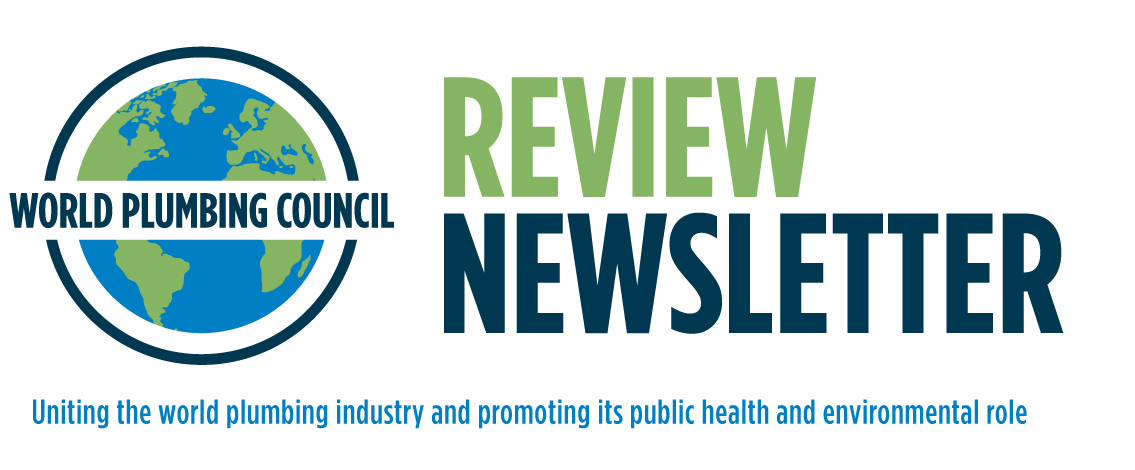
 The Holistic Approach to Plumbing Systems
The Holistic Approach to Plumbing Systems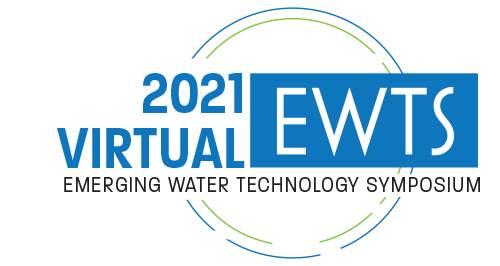 The co-conveners of the 2021 Emerging Water Technology Symposium (EWTS) have determined that due to the ongoing COVID-19 pandemic the event will go forward as a two-day virtual symposium, scheduled for May 11-12. The EWTS was previously scheduled to be convened on those dates as a live, in-person event in San Antonio, TX.
The co-conveners of the 2021 Emerging Water Technology Symposium (EWTS) have determined that due to the ongoing COVID-19 pandemic the event will go forward as a two-day virtual symposium, scheduled for May 11-12. The EWTS was previously scheduled to be convened on those dates as a live, in-person event in San Antonio, TX.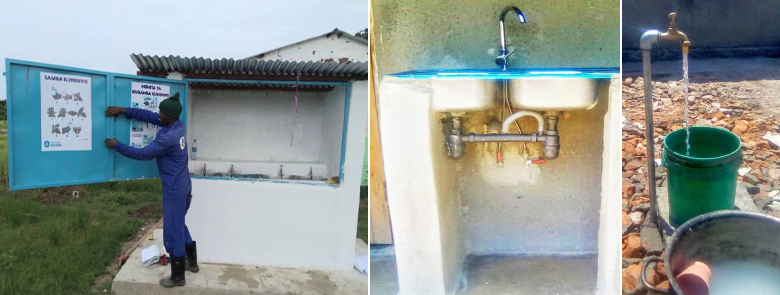
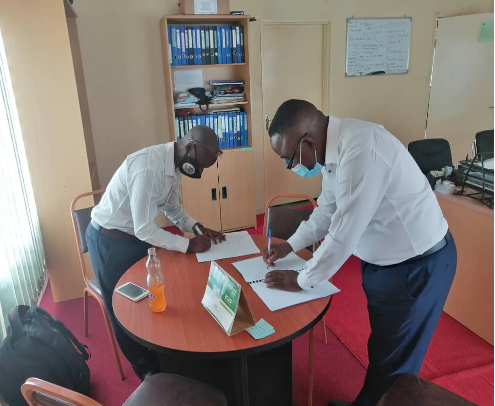 Submitted by Moses Chongo, CEO/President, Plumbers Association of Zambia
Submitted by Moses Chongo, CEO/President, Plumbers Association of Zambia